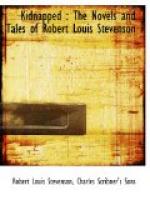“James must have tint his wits,” said Alan. “If this was the soldiers instead of you and me, he would be in a bonny mess. But I dare say he’ll have a sentry on the road, and he would ken well enough no soldiers would find the way that we came.”
Hereupon he whistled three times, in a particular manner. It was strange to see how, at the first sound of it, all the moving torches came to a stand, as if the bearers were affrighted; and how, at the third, the bustle began again as before.
Having thus set folks’ minds at rest, we came down the brae, and were met at the yard gate (for this place was like a well-doing farm) by a tall, handsome man of more than fifty, who cried out to Alan in the Gaelic.
“James Stewart,” said Alan, “I will ask ye to speak in Scotch, for here is a young gentleman with me that has nane of the other. This is him,” he added, putting his arm through mine, “a young gentleman of the Lowlands, and a laird in his country too, but I am thinking it will be the better for his health if we give his name the go-by.”
James of the Glens turned to me for a moment, and greeted me courteously enough; the next he had turned to Alan.
“This has been a dreadful accident,” he cried. “It will bring trouble on the country.” And he wrung his hands.
“Hoots!” said Alan, “ye must take the sour with the sweet, man. Colin Roy is dead, and be thankful for that!”
“Ay” said James, “and by my troth, I wish he was alive again! It’s all very fine to blow and boast beforehand; but now it’s done, Alan; and who’s to bear the wyte* of it? The accident fell out in Appin—mind ye that, Alan; it’s Appin that must pay; and I am a man that has a family.”
* Blame.
While this was going on I looked about me at the servants. Some were on ladders, digging in the thatch of the house or the farm buildings, from which they brought out guns, swords, and different weapons of war; others carried them away; and by the sound of mattock blows from somewhere farther down the brae, I suppose they buried them. Though they were all so busy, there prevailed no kind of order in their efforts; men struggled together for the same gun and ran into each other with their burning torches; and James was continually turning about from his talk with Alan, to cry out orders which were apparently never understood. The faces in the torchlight were like those of people overborne with hurry and panic; and though none spoke above his breath, their speech sounded both anxious and angry.
It was about this time that a lassie came out of the house carrying a pack or bundle; and it has often made me smile to think how Alan’s instinct awoke at the mere sight of it.
“What’s that the lassie has?” he asked.
“We’re just setting the house in order, Alan,” said James, in his frightened and somewhat fawning way. “They’ll search Appin with candles, and we must have all things straight. We’re digging the bit guns and swords into the moss, ye see; and these, I am thinking, will be your ain French clothes. We’ll be to bury them, I believe.”




